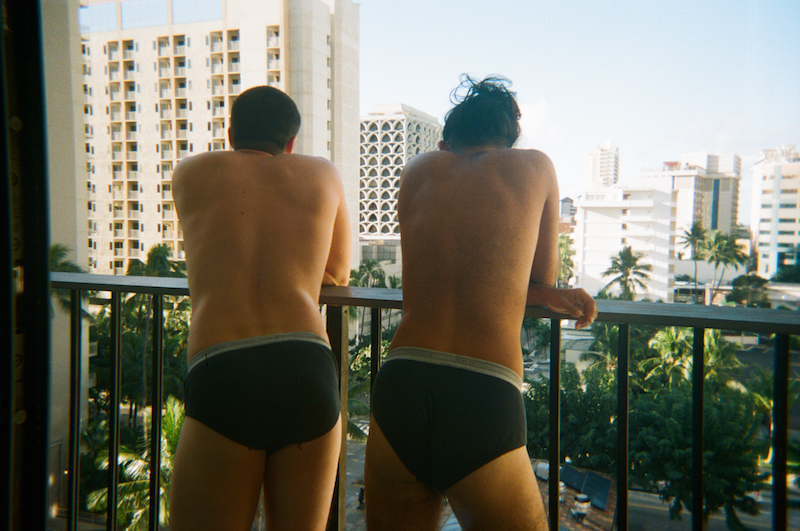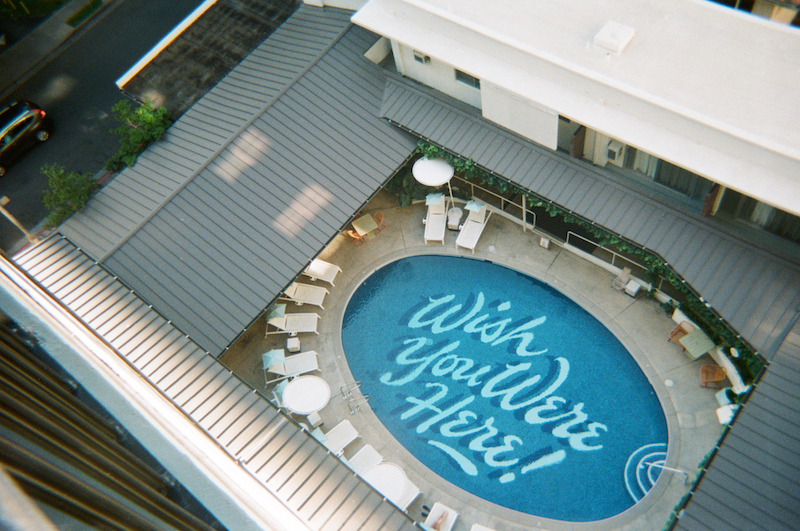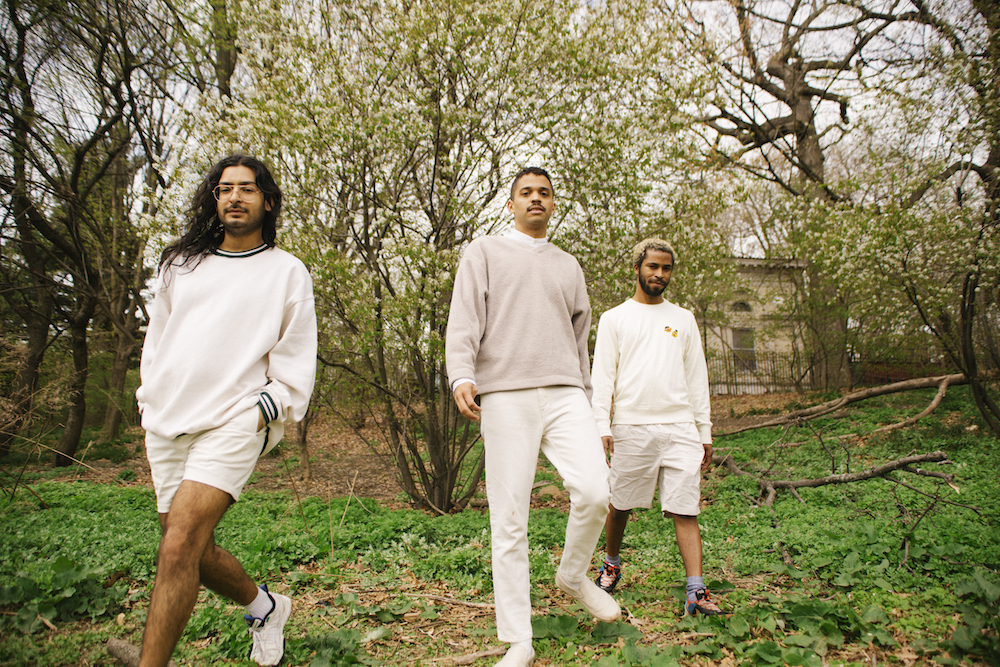The New York-based collective Papi Juice turns up the volume on representation and gets down in solidarity.
Text by Calla Camero
Images by Kevin Aranibar-Molina
A typical Papi Juice dance party starts like no typical party at all. Diverse groups of ethnicities and gender expressions pour into the room as the dance floor sways with bodies dressed in color-popping club looks as unique as the personalities of those wearing them. The DJ turns the music up as the beat transitions to “Thotiana” by Blueface, cueing the crowd to shout “Ayyyye!” and drop it down even lower. It’s 10:15 p.m., and Papi Juice has only just begun.
“Someone mentioned that Papi felt like a house party, and it’s become one of my favorite descriptions,” says Papi Juice co-founder Adam Rhodes. “Wherever we go, individually and as a group, we always bring that with us and make it feel that way. Even as we grow bigger, we try to keep that intention.”

Ultimately, what sets this party apart from any other club night is the intention Papi Juice establishes to create a space that affirms and celebrates the lives of queer and transgender people of color. The collective, which is now a platform for artists of color, was started in 2013 by Adam and his close friend Oscar Nuñez, both Brooklyn-based DJs who were frustrated with New York City’s traditional gay spaces, which were composed of mostly white and cisgender men.
“We felt invisible, like our cultures weren’t being represented, or our beauties, or our creativity wasn’t ever really valued,” says Oscar, who is from Honduras but has lived in New York for 10 years. “We weren’t seeing ourselves, not only in the community or the audiences, but also in the art [world], so that translated into nightlife as well. That’s when we were like, we should start our own night.”
Growing the Family
After a couple successful parties with increasing attendance, Adam and Oscar welcomed Brooklyn-born illustrator Mohammed Fayaz into the Papi Juice family. Six years after its first party, held at Bed-Stuy’s since-shuttered One Last Shag with a maximum capacity of 75 people, Papi Juice has turned into a global artistic movement that reaches beyond the nightlife scene. The collective also organizes daytime sober events, group discussions, and art and musical collaborations for the LGBTQ+ community.
Successes aside, building the perfect party from the ground up proved a painful and difficult feat for the trio. In those earlier years, they experienced a lot of racist, homophobic, and transphobic discrimination from venue owners. “We would be looking at a venue spot and they would be like, ‘Oh, you’re a little bit too niche for us,’” Adam says. Venues would pigeonhole Papi Juice as a “gay party” and deny the event, claiming they didn’t “wanna be known as the gay bar.” For the founders, such experiences only confirmed the need for their events.
Today, peers doing similar work around the city, and in other cities, make for good company for the Papi Juice crew. Part of that community is Bubble_T, a New York-based collective celebrating queer Asian visibility. To ring in 2019, Oscar and Mohammed joined Bubble_T in Honolulu, Hawai‘i, to throw a daytime pool party for Lei at the Surfjack hotel in Waikīkī.


As fun as the pool party was, Oscar and Mohammed also wanted to share with Hawai‘i what they do best: nightlife. So together with Bubble_T, Hawai‘i friends, and connections made on the trip, the crew threw another party just three days later. The event, Mahu Mix, was held at Aupuni Space in Kaka‘ako.
“We really wanted to plug into the scene there and see the kind of spaces and what kind of things people were doing,” Oscar says. “It was the perfect place to do this nightlife event.”
They gathered local DJs in Aupuni’s exposed gallery space—think a local garage, but with contemporary artwork lining the walls—to create an indoor-outdoor experience, which made the party feel more inclusive to Hawai‘i’s community. The music was amplified out onto the street, with people spilling out to the sidewalk, dancing through projected visuals, and conversing with one another. The turnout, while smaller in numbers than their usual Brooklyn events, left a lasting impression on Oscar and Mohammed because of the people they met and the relationships that were cemented.

Meeting the Cute Guy
Mohammed recalls meeting a cute guy at Mahu Mix who was there with his cousins. “They were just really excited to go out together,” he says. “And that’s so tapping into the way that you grow up there—just him being open to bringing family to this party. So exciting.”
“That’s the thing, we’re all from these cultures where that’s the norm,” Oscar says of finding common ground with Hawai‘i’s family-oriented culture. “If we were in Honduras, I’d have 25 cousins I’d want to bring. And it makes so much sense because we’re all kinda cousins. We’re all people of color.”
Outside of the local party scene, Oscar and Mohammed found time to explore O‘ahu. They ate shave ice on the North Shore; swam at Keawa‘ula Beach (also known as Yokohama Bay) on the west side; danced at gay bars in Waikīkī; toured Shangri La Museum of Islamic Art, Culture, and Design in Kāhala; and hiked the famously steep stairs of Koko Crater in Hawai‘i Kai. “I think it was one of the most productive vacations I’ve ever had in my life, because we literally trolled the island of O‘ahu,” Oscar laughs. “We went everywhere.”
For Oscar and Mohammed, their visit to Hawai‘i was especially memorable because of the people who helped them see what the culture is all about by opening their homes, cooking food, showing them around, supporting Papi Juice, and overall demonstrating the spirit of the islands and its LGBTQ+ community.
“My friends said to me, and this is corny, but home is really wherever your family is. And we had like 12 people there that were really like my family, and we met so many new people in Hawai‘i that became my family,” Oscar says.
“And also it’s in the name,” Mohammed adds. “Anyone can be a Papi.”



